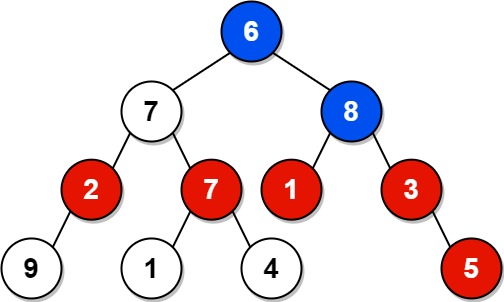Problem
Given the root of a binary tree, return **the sum of values of nodes with an *even-valued grandparent***. If there are no nodes with an *even-valued grandparent*, return 0.
A grandparent of a node is the parent of its parent if it exists.
Example 1:

Input: root = [6,7,8,2,7,1,3,9,null,1,4,null,null,null,5]
Output: 18
Explanation: The red nodes are the nodes with even-value grandparent while the blue nodes are the even-value grandparents.
Example 2:

Input: root = [1]
Output: 0
Constraints:
The number of nodes in the tree is in the range
[1, 10^4].1 <= Node.val <= 100
Solution (Java)
/**
* Definition for a binary tree node.
* public class TreeNode {
* int val;
* TreeNode left;
* TreeNode right;
* TreeNode() {}
* TreeNode(int val) { this.val = val; }
* TreeNode(int val, TreeNode left, TreeNode right) {
* this.val = val;
* this.left = left;
* this.right = right;
* }
* }
*/
class Solution {
public int sumEvenGrandparent(TreeNode root) {
if (root == null) {
return 0;
}
return dfs(root, root.left, 0) + dfs(root, root.right, 0);
}
private int dfs(TreeNode grandparent, TreeNode parent, int sum) {
if (grandparent == null || parent == null) {
return sum;
}
if (grandparent.val % 2 == 0 && parent.left != null) {
sum += parent.left.val;
}
if (grandparent.val % 2 == 0 && parent.right != null) {
sum += parent.right.val;
}
sum = dfs(parent, parent.left, sum);
sum = dfs(parent, parent.right, sum);
return sum;
}
}
Explain:
nope.
Complexity:
- Time complexity : O(n).
- Space complexity : O(n).